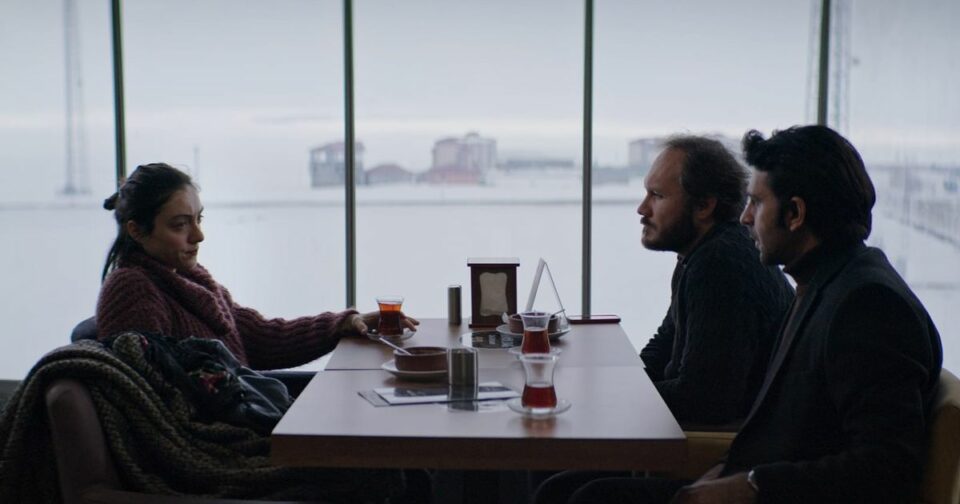Time moves slowly in Nuri Bilge Ceylan’s About Dry Grasses. Characters trudge sluggishly across snow-covered landscapes. Conversations drift in all sorts of directions before finally gaining focus, and then drift back out again. Even the windshield wipers on the cars seem to move with their own stately cadence. The Turkish director, who has over the past two decades become one of international cinema’s brand-name auteurs (and whose films have won just about every single juried award at Cannes), is known for his deliberate pacing, his weighty subjects, and his melancholy characters. Clocking in at 197 minutes — one minute longer than 2014’s Palme d’Or–winning Winter Sleep — About Dry Grasses is Ceylan’s longest film to date. It’s also among the most hypnotic works of his career, and certainly one of the best movies of this or any other year.
Ceylan’s early career was marked by films that embodied the submerged, distant qualities of his protagonists. These were elliptical and quiet pictures, located somewhere between the deadpan and the pastoral. (His 2002 breakthrough, Distant, was set largely in Istanbul, but its dryly funny story about a city-mouse artist and his country-mouse cousin trying and failing to live together was haunted by memories and images of small-town life.) When people spoke in these films, their words were clipped or oblique. They talked around uncomfortable things, or avoided them almost entirely. Often, their voices seemed to recede into the background.
Sometime around Winter Sleep, however, Ceylan’s characters began talking more. The films remained visually striking, dripping atmosphere, but now they also featured long back-and-forths about all manner of abstract subjects. 2018’s The Wild Pear Tree was built around a series of conversations its young protagonist, an aspiring author and teaching student, had with a cross-section of clerics, bureaucrats, and other strangers. That picture’s bravura centerpiece was a lengthy debate with an established author about a variety of topics: literary theft, the difference between the art and the artist, the importance of messaging versus aesthetics. That may sound deadly dry, but every time I saw The Wild Pear Tree, the audience burst into applause at the end of the sequence. Ceylan knows how to hold our attention.
There’s a similar sequence in About Dry Grasses, a winding conversation between the film’s nominal protagonist, a 30-something schoolteacher named Samet (Deniz Celiloglu), and fellow educator Nuray (Merve Dizdar, who won a deserved Best Actress award at last year’s Cannes) about the importance of political action. Nuray, who lost a leg in the notorious 2015 terrorist bombing of a peace rally in Ankara, is an activist who still believes in the importance of struggling for seemingly utopian ideals. Samet, who never seems to commit to anything, argues that it’s not only meaningless to try and achieve impossible ends, but that the adherence to collective ideals is itself counterproductive. He cites an old proverb: “If you travel in a herd, all you’ll see are asses.”
Their left-liberal debate is heated and they talk swiftly. Ceylan loves to disrupt his otherwise naturalistic performances with these extended, clearly scripted exchanges that prompt us to watch (and listen) differently. The camera angles become more dramatic, the lighting more mysterious, as if we’ve entered a fringe reality, a different consciousness. We might start to notice that we’re really watching the director argue with himself over what it means to be progressive in this world.
About Dry Grasses riffs on a common trope in Turkish film and literature of teachers who travel to remote, rural corners of the country to educate and ennoble the people who live in these impoverished communities. Back in the day, such stories were meant to reflect the benevolence of the country’s educated elites in helping educate and unify the nation. Today, they just as often demonstrate the disconnect between these worlds. Samet has been teaching in this small town in eastern Turkey for four years and he’s dying to be transferred out of there, hopefully to Istanbul. Far from being a self-sacrificing educator, he can barely contain his contempt for this place and the people around him. At the same time, he’s a talented photographer (not unlike Ceylan himself), and the film is filled with lovely passages in which we see Samet’s portraits of those who populate these mountains: shepherds, children, guerillas, teachers, soldiers. The film purposefully never reconciles this contradiction; Samet can capture all this beauty, but he doesn’t truly see these people. Maybe it’s not such a contradiction. Again, the director seems to tap into his own anxieties.
This is a rough, forbidding landscape, full of the potential for violence. A young man who keeps talking about taking up arms remembers how his father was whisked away in the middle of the night by soldiers, never to be seen again. Another teacher with whom Samet shares a flat, a local named Kenan (Musab Ekici), tells him about how his brother-in-law was mistaken for a government spy and murdered in cold blood. Embodying his above-it-all posture from the debate with Nuray, Samet steers clear of politics and even tries to change the subject whenever possible. He goes along to get along. He’ll have tea with an aspiring guerilla and then play video games with the head of the local military outpost. He also has an uncomfortably flirty friendship with one of the young girls at his school, buying her presents and always calling on her in class, a situation that soon blows up in his face. Samet likes being liked — and over the course of the film we see just how destructive that attitude can become, as this ostensibly unassuming man achieves almost melodramatic levels of villainy.
Ceylan’s causticity is deep, but it’s not showy, and it’s not particularly cruel. Like the Russian writers he so admires, he is a paradox: a scathing humanist. He lets a character like Samet debase and condemn himself, and the degradations carry extra force because the director so clearly understands and identifies with this man on some level. And in the end it all somehow becomes part of the film’s expansive, compassionate vision. About Dry Grasses ends with a magnificently lyrical reverie, an imagined letter from Samet that’s full of frustration, tenderness, hope, heartache, and resignation. But it’s a letter we know he will never write; it resolves nothing. We walk away from the film with a dark empathy for these people, and for ourselves.
More Movie Reviews
- Let the Hypnotic, Caustic Beauty of About Dry Grasses Consume You
- Unfortunately, Madame Web Is Bad in a Boring Way
- There’s a Great Movie to Be Made About Bob Marley. One Love Is Not It.
Bilge Ebiri , 2024-02-23 19:42:06
Source link


